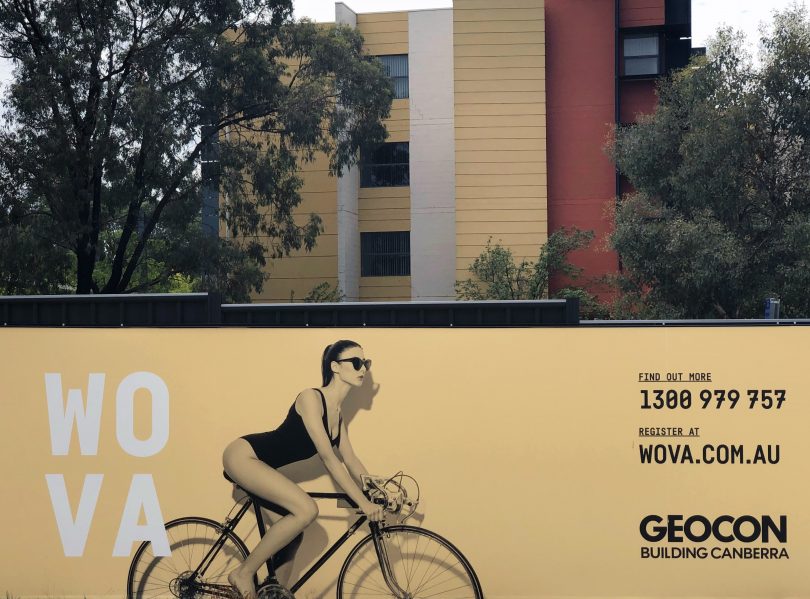
The Geocon fence ad in question. Photo’s: Ian Bushnell.
This advertising for Geocon’s proposed redevelopment of the Woden Tradies Club site has got people talking, but not in the way the Canberra developer may have intended.
It drew the ire of a Canberra woman who shared her concerns on Facebook, and encouraged by her friends, approached Geocon and lodged a complaint with the Advertising Standards Bureau.
“Seemingly inexplicably, Geocon has chosen to use a scantily clad woman on a bicycle to advertise the latest construction development in Woden,” she posted on Facebook.

“The man in the advertisement gets to wear a shirt and jacket, but the woman is in a tiny body suit or swimsuit … her only protective gear is a pair of sunglasses. No helmet, no sun protection, not even shoes. Her ergonomics are also terrible. She can’t possibly be engaging her core properly with her back arched to thrust out her buttocks and breasts like that.
“Just what is she meant to be doing? Some kind of a hybrid fashion parade/triathlon?
“Or is Geocon just objectifying women here?
“Whoever paid for this ad campaign needs a wake-up call that it is 2018. And maybe Geocon can redeem itself by donating the same amount of money to women’s cycling.”
Facebook responses included:
- “And tell them that it’s not cool, not funky and no one wants to look that stupid. It’s not Bondi! It’s Canberra! Marketing fail.”
- “Total shocker.”
- “Are things ever really going to change? This is ridiculous, clearly a boys club is running Geocon, the company that put together the campaign and the advertising body with their appropriate code of conduct standards.”
Geocon’s response to the complainant was similar to its submission to the Advertising Standards Board, which dismissed the complaint on 19 December.
It said the aim of the advertising was to attract interest in the development and convey an aspirational, chic lifestyle.
“Vibrant colours and striking images of cool, confident people have been used to convey this. The graphics, including the woman posting stationary on a bike, are highly stylised and conceptual only. They were not intended to portray the women in a sexist or inappropriate way – and also were not intended to offend members of the community.”
Libby Steeper, another aggrieved community member, said the company had misread the Canberra market where people are better educated and can pick a ‘sleazy’ attempt quickly.
She said the ad was unsuitable for this day and age and rejected the company’s claim of it being aspirational and chic, saying something social with clothes on would be more appropriate.
“Somebody having a glass of wine with friends would be chic,” she said.
Ms Steeper said the ad was obviously objectifying women and aimed more at younger men.
“What woman exercises like that in public? You would never see a woman dressed like that walking through the streets,” she said.
In her complaint to the Advertising Standards Bureau, the complainant said: “This type of sexualised imagery perpetuates attitudes that treat women as second-class citizens and sex objects leading to the current epidemic of violence against women. This is not a message or attitude that should be promoted anywhere but especially not in such a prominent and visible place.”
She also noted that the woman was not wearing a helmet, as required by ACT law.
Geocon’s submission argued that the advertising focuses on interpretive ”lifestyle” and was not literal.
“The models are highly stylised and portray a modern, hip, cosmopolitan look and feel that is aspirational and appeals to a demographic that is our target audience,” it says.
“The intention is to inspire ideas of a ‘way of living in Woden’, that is contemporary, edgy, liberal, progressive, professional, successful, healthy and aspirational. The models are conservative, yet edgy and boast a European style, depicting a level of glamour, sophistication and success.”
It rejected any notion that the imagery was sexualised or could be seen as degrading.
“The image of the woman on the bicycle is not sexualised or sexually explicit in any way, nor could it be interpreted as exploitative or degrading in nature. She is wearing a swimsuit, on a stationary bicycle, depicting health, confidence and independence. There is no nudity or exposed private areas, no inappropriate interaction with others in the image. The woman is depicted in a positive light, referencing a happy, healthy, confident person enjoying an aspirational lifestyle, which is relevant to the product being sold.”
The submission also said there was nothing to suggest that the woman was cycling on a road or street without a helmet, indicating a disregard for safety.
The Advertising Standards Board found that because the woman was depicted exercising, the image was not demeaning to women.
“The Board considered the depiction of the woman in this manner is not a representation that the Board considered lowered the woman in character or purposefully debased the woman for the enjoyment of others,” the determination said.
The Board found that the images were not sexually suggestive or inappropriate for a broad audience, including children.
It also accepted the argument that the bicycle was stationary and therefore safety was not an issue.
What do you think? Does the ad cross the line? Does it achieve what it is aiming to do?












